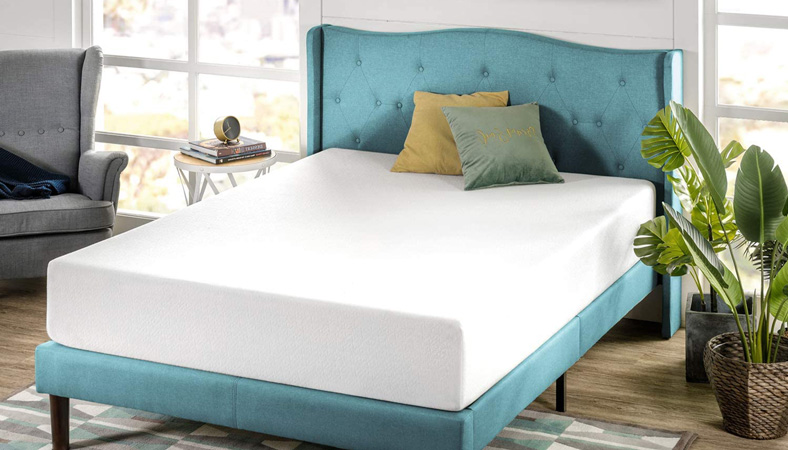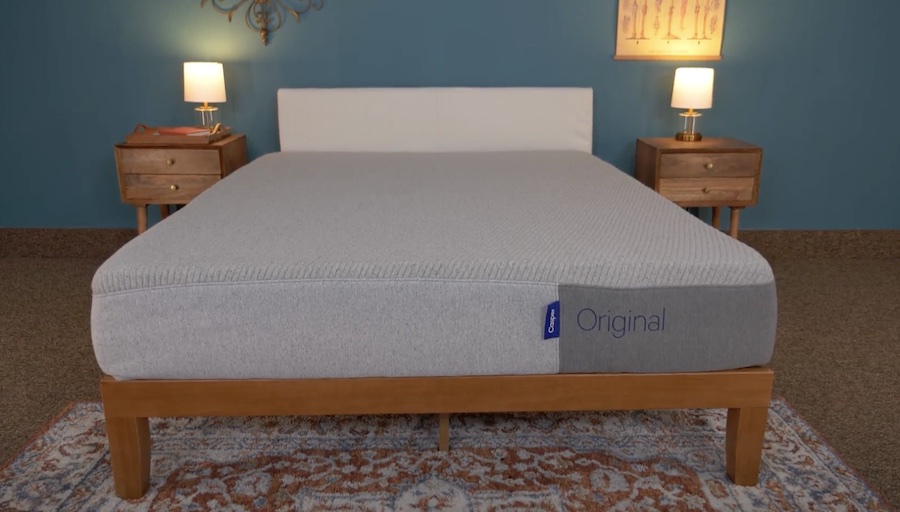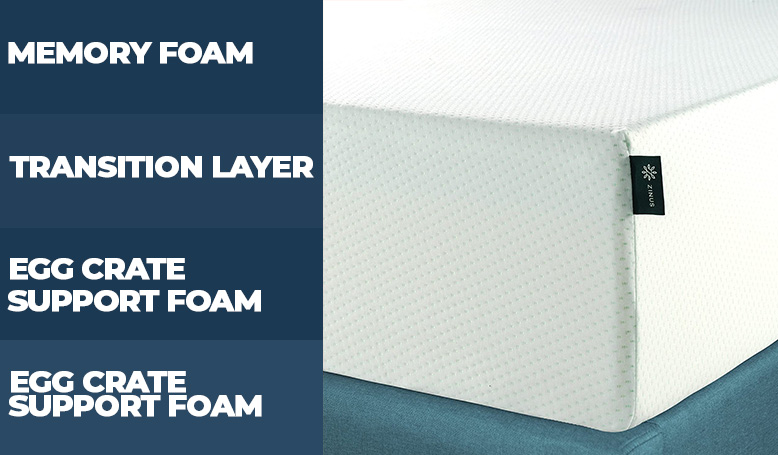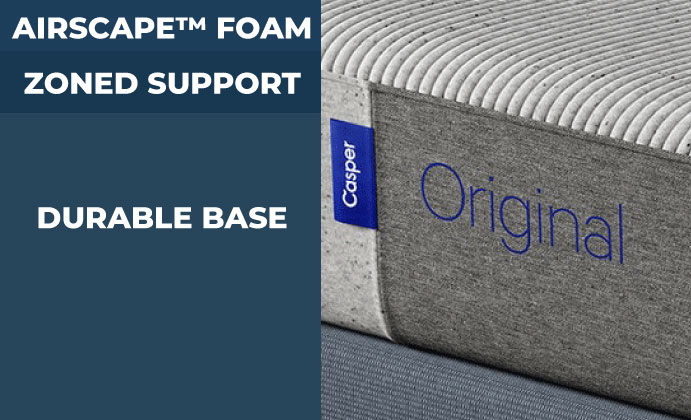The Zinus Green Tea and the Casper Original are two popular all-foam mattresses. While Casper utilizes patented technology for better spine support and a breathable cooling cover, Zinus is a frugal shopper’s delight with appealing features like a refreshing green-tea scent and a flexible knitted cover. It may be tempting to go with the budget-friendly option, but you also need to consider your needs so that the mattress you buy lets you sleep comfortably.
So, which one should you choose? Let’s look deeper at the main similarities and differences between these top-performing brands to help you make the right decision when choosing your dream mattress.
Product
Type
Score

Product
Type
Score

Casper Original Mattress

Product Details
Our Recommendation
Financing Options
Financing options are available for this mattress.
Who I’d Recommend the Casper For
- Couples – Partners more inclined to move during the night will enjoy Casper’s minimal motion transfer. The excellent absorption from the foam will minimize movement so you don’t disturb your significant other and vice versa.
- People who want advanced support – Thanks to its Zoned Support™ design, the Casper can provide more nuanced support by being firmer beneath heavier areas like the hips and lower back and then softer beneath the shoulders.
- Hot sleepers – The Casper’s top layer of AirScape™ keeps airflow circulating to prevent heat-trapping, helping you stay cool throughout the night.

Zinus Green Tea Memory Foam Mattress

Product Details
Our Recommendation
Financing Options
Financing options are available for this mattress.
Who I’d Recommend the Zinus For
- Buyers on a budget – You can’t beat Zinus’ excellent price point. Most memory foam mattresses can cost thousands of dollars, but this mattress offers an excellent cost-effective alternative.
- Sleepers who enjoy a fresh-smelling mattress – The Zinus’s combination of green tea extract, castor seed oil, and purified charcoal should please anyone who has a sensitive nose and would prefer a bed that smells fresher.
- Sleepers who shift positions – The Zinus’s 10-inch size should be suitable for those who want equal comfort no matter how they sleep. If the 10-inch isn’t for you, though, the Zinus offers multiple size options.
Comparing Casper vs Zinus: Top Similarities
- Pressure relief – Both mattresses have middle foam layers that provide 2 inches of extra support for those seeking extra relaxation for shoulder and back pain.
- Firmness – We rate the Zinus and Casper a 6 out of 10 on the firmness scale, which is perfect for average sleepers or couples looking for something right down the middle.
- Bed-in-a-box – By cutting out the middleman and selling online, both companies can keep costs lower for the customer.
Comparing Casper vs Nectar: Key Differences
- Price – The Zinus is significantly lower priced than the Casper.
- Coolness – Casper’s AirScape™ technology promotes better airflow and cooling.
- Off-gassing – When unboxing the mattresses, the Casper will have a more noticeable odor when decompressing, unlike the Zinus, which has a natural green tea extract.
Comparing Firmness, Support & Feel
Firmness
We rate mattress firmness on a 1-10 scale. For instance, if you’re lighter-weight or enjoy side sleeping, you might prefer a softer mattress (1-4). On the other hand, stomach and plus-size sleepers may need a firmer option (7-10). For the average sleeper, you may find what you need right in the middle (5-6).
The Zinus and the Casper both rate at a 6 in firmness. Beds with a medium firmness are common since they’re more accommodating for a wider variety of sleepers.
Support
The Casper is known for its Zoned Support™ foam design, providing targeted upper and lower body support and comfort. This enhanced support system could be great for those dealing with back issues.
The Zinus’s second and third layers provide the bulk of the support for this mattress, helping to ensure the sleeper’s spine remains well-aligned. However, both beds don’t rate well for heavy sleepers, which means these people likely won’t get enough support from these mattresses.
Feel
You should feel immediately cradled by Casper’s cozy memory foam and feel the lower layer shift to the shape of your body. The Zinus also has a comfy top layer, with the added bonus of smelling naturally fresh thanks to the green tea extract and other infusions.
If you lie or sit near the edge of the bed, you’ll probably feel like you could roll off the Zinus, as this bed ranks lower than the Casper regarding edge support.
Comparing Sinkage and Bounce
The Casper and Zinus are memory foam beds, so neither offer exceptional bounce, which could be a drawback for those with limited mobility or sexually-active couples. However, Casper offers a hybrid version of this mattress that might be a better fit for those looking for more bounce.
Regarding sinkage, the Zinus’s top layer provides a gentle sinking sensation that slowly contours the body. The supportive middle and lower layers relieve pressure on the hip and shoulders. The Casper’s minimal sinkage is below average for memory foam mattresses, which may not be ideal for some lightweight sleepers.
Comparing Motion Transfer
For sleepers sharing a bed, how well the mattress isolates movement can be a high-ranking feature. Motion isolation means that movement on one side of the bed doesn’t transfer over to the other side. Nothing’s worse than losing sleep due to feeling the vibrations across the bed, and the good news is that Zinus and Casper perform exceptionally well in this category.
Thanks to their memory foam construction, both of these mattresses quickly absorb movement on the bed, which should excite anyone who spends their night beside a restless sleeper.
Comparing Cooling
The Casper mattress truly shines when it comes to cooling and regulating temperature. As mentioned, their trademark AirScape™ foam helps air circulate smoothly and prevents heat retention. For hot sleepers, this means less sweat and more sleep.
The Zinus’ middle and bottom layers promote airflow, making it better than most traditionally-designed memory foam mattresses. However, it still might be too warm for some, and they end up having to upgrade to Zinus’ gel-infused top layer for heat reduction. Therefore, the Casper is the way to go if you’re a hot sleeper and don’t want to worry about extra purchases.
Comparing Construction (Materials & Quality)
Zinus Construction
The 10-inch Zinus mattress starts with a stretchable and soft knitted cover. This Jacquard fabric offers a smooth texture and breathability at the surface. The rest of the Zinus is made up of three foam layers.
Additionally, the foams in the Zinus are CertiPUR-US® certified, ensuring the bed meets strict health and safety standards.
- Under the cover is a green tea memory foam that delivers a freshness not usually found in this type of mattress. The BioFoam® found here not only adds extra comfort, but the material also uses natural seed oil, which reduces the use of chemicals.
- The middle layer forms a 2-inch transition unit that aids in support, pressure relief, and cooling throughout the entire mattress.
- The third layer is the foundation of the Zinus and the primary support piece. The base’s design has a convoluted egg crate structure that supports continuous airflow. This 5.5-inch high-density foam should help keep you lifted while the convoluted design fosters additional cooling.
Casper Construction
The 11-inch Casper mattress uses polyurethane foam and should be ready within minutes of opening (depending on the bed size). Like the Zinus, the Casper has a knitted cover that’s as soft as it is stretchable. This bed is also CertiPUR-US® certified, so you can sleep better at night knowing your Casper wasn’t made with unknown chemicals and materials.
- The top layer of the Casper features a breathable perforated foam called AirScape™. Casper’s exclusive AirScape™ foam helps regulate temperature, keeping you nice and cool at night. This foam should also provide some slight bounce at the surface.
- The second layer has three areas of Zoned Support™ expertly crafted to be softer for the shoulders and firmer for the hips and waist. This 2-inch thick layer also aids in spine alignment regardless of your preferred sleep position.
- The bottom layer provides a supportive and durable base to ensure lifting where you need it most.
Comparing Company Policies & Price
- Warranty – Zinus and the Casper each offer a 10-year limited warranty on these beds.
- Shipping – Both Casper and the Zinus provide free shipping within the United States. If you’d like a professional installation, Casper will send someone to set up your bed for an additional fee.
- Trial Period – Both mattresses come with a 100-night trial, which gives you over three months to see if they suit your needs.
- Returns – Zinus will give you a full refund so long as it’s within the 100-night trial period and in good condition. Casper will refund you within their trial period but only after the 30-Night Adjustment Period.
- Price – Zinus will be the more cost-effective option, starting at roughly 700 dollars less than the Casper. However, Zinus doesn’t have as many size options as Casper.
[table id=1088 responsive=scroll /]
Casper vs. Zinus Compared Side-by-Side
[table id=1089 responsive=scroll /]
Final Thoughts
The Zinus is a steal, coming in way lower than the Casper. While the Casper may cost more, it offers excellent motion isolation, edge support, cooling, and pressure relief. Plus, the advanced zoning in this bed could make a positive difference for someone with back aches.
For those who need a bed on a budget or want to avoid that new mattress smell that often comes with online mattresses, Zinus should fit the bill. For those who need better back support and heat prevention, Casper is the way to go.
You can also read our full-length reviews of each bed to help you make a more informed decision.
Product
Type
Score

Product
Type
Score
More Casper Comparisons:
- Casper vs. Leesa
- Casper vs. Novosbed
- Casper vs. Lull
- Casper vs. WinkBed
- Casper vs. Saatva
- Casper vs. Layla
- Casper vs. DreamCloud
- Casper vs. Zenhaven
- Casper vs. Brooklyn Aurora

Jill Zwarensteyn
Editor
About Author
Jill Zwarensteyn is the Editor for Sleep Advisor and a Certified Sleep Science Coach. She is enthusiastic about providing helpful and engaging information on all things sleep and wellness.
Combination Sleeper


